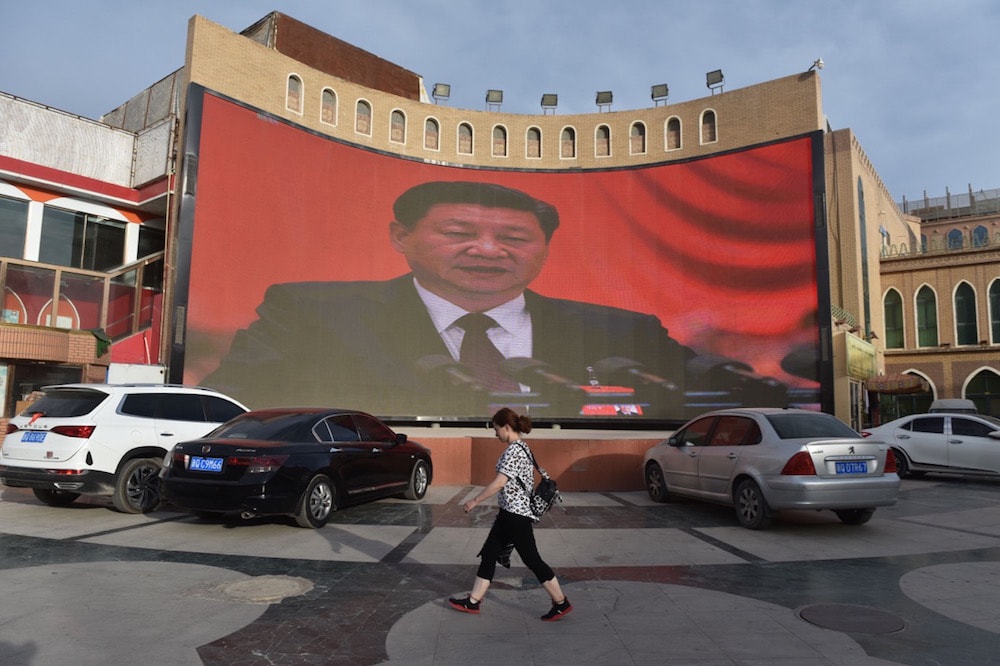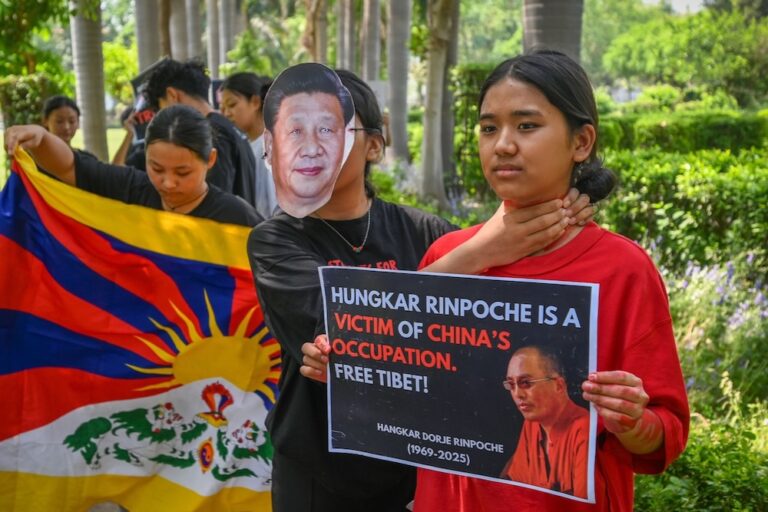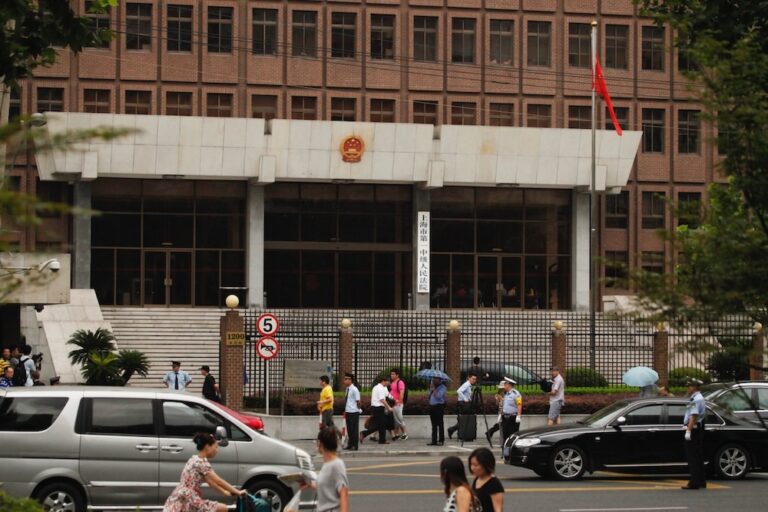A leaked list of over 2,000 detainees demonstrates automated repression. Human Rights Watch has published a study documenting further evidence of China’s use of technology in its repression of the Muslim population.
This statement was originally published on hrw.org on 9 December 2020.
A big data program for policing in China’s Xinjiang region arbitrarily selects Turkic Muslims for possible detention, Human Rights Watch said today. A leaked list of over 2,000 detainees from Aksu prefecture provided to Human Rights Watch is further evidence of China’s use of technology in its repression of the Muslim population.
The big data program, the Integrated Joint Operations Platform (IJOP), apparently flagged the people on the Aksu List, whom officials then evaluated and sent to “political education” camps in Xinjiang.
“The Aksu List provides further insights into how China’s brutal repression of Xinjiang’s Turkic Muslims is being turbocharged by technology,” said Maya Wang, senior China researcher. “The Chinese government owes answers to the families of those on the list: why were they detained, and where are they now?”
Human Rights Watch first reported on the IJOP in February 2018, noting that the policing program aggregates data about people from various sensory systems in Xinjiang, and flags to officials those it deems potentially threatening. Officials then evaluate these individuals’ “general performance” together with other sources of information, and send some to political education camps and other facilities. Human Rights Watch “reverse engineered” the IJOP mobile app in May 2019 and revealed the dubious criteria this mass surveillance system was programmed to flag, including many lawful behaviors.
The Aksu List, dated around late 2018, is similar to another leaked file, the Karakax List. That list – of people detained for having relatives abroad – dated around June 2019, provides an assessment of whether an individual should remain in detention. The IJOP is also repeatedly mentioned in the Karakax List. Together the lists provide two snapshots of Xinjiang’s bureaucracy, as it picks and vets its victims in the process of coerced thought transformation: the decision to detain people and the decision to keep them in detention. At both stages, the IJOP system assists officials in selecting targets.
The entry for “Ms. T” on the Aksu List illustrates how the program’s algorithms identify legal behaviors as grounds for detention. It notes that she was detained because the IJOP system had flagged her for “links to sensitive countries.” It reported that Ms. T had received four calls from a foreign number in March 2017, down to the number of seconds. In other words, the IJOP system is programed to pick out particular behavior, calls to a foreign number, noting the precise duration of the calls. Human Rights Watch called that number and found that it belongs to Ms. T’s sister.
Ms. T’s sister said that Xinjiang police interrogated Ms. T around the time the Aksu List recorded her detention date. The police had specifically asked about her sister because she lives abroad. Ms. T’s sister said she has had no direct contact with her family in Xinjiang since then, but heard via an intermediary that Ms. T – presumably upon her release from a political education camp – was now working in a factory five days a week and allowed to go home only on weekends. Ms. T’s sister believes Ms. T is being forced to work in a factory against her will, noting that Ms. T had been training for a different career before she was detained.
Human Rights Watch’s analysis of the Aksu List strongly suggests that the vast majority of the people flagged by the IJOP system are detained for everyday lawful, non-violent behavior. This contradicts the Chinese authorities’ claims that their “sophisticated,” “predictive” technologies, like the IJOP, are keeping Xinjiang safe by “targeting” criminals “with precision.”
The mass surveillance and arbitrary detention of Xinjiang’s Turkic Muslims violate fundamental rights under China’s constitution and international human rights law. Article 37 of the constitution states that all arrests must be approved by either the procuratorate (the state prosecution agency) or the courts.
Yet Human Rights Watch research indicates that neither agency appears to be involved in these detentions. Rather, administrative officials, including police officers, make the sole decision to detain someone. Those facing detention have no right to due process, including access to lawyers and family members, or a chance to stand trial to contest such allegations. The use of intrusive surveillance, including in and around people’s homes, also violates everyone’s right to privacy.
“‘Predictive policing’ platforms are really just a pseudo-scientific fig leaf for the Chinese government to justify vast repression of Turkic Muslims,” Wang said. “The Chinese government should immediately shut down the IJOP, delete all the data it has collected, and release everyone arbitrarily detained in Xinjiang.”
The Aksu List: Authentication
In August, Radio Free Asia’s Uyghur Service provided Human Rights Watch with an Excel spreadsheet titled “List of IJOP Trainees” with the names of over 2,000 people obtained from an anonymous Xinjiang source in late 2018. The sheet has columns that include the person’s name, gender, the date of their detention in a political education camp, the reason for their detention, the number of their detention facility or cell, the batch number from which the IJOP systems picked them out, and the reason why, usually no more than a sentence or two.
Although the sender has not been identified, the list appears to come from a part of Aksu prefecture where 80 percent of the residents are Uyghurs. Human Rights Watch is confident that all the people on the Aksu List are Uyghurs. About half of the list are men and the other half women. Their detention dates ranged from mid-2016 to late 2018. At the peak, well over 100 people were detained on a single day. To protect the source, Human Rights Watch is obscuring the precise location of the Aksu List, precise dates, and some of the numbers throughout the analysis.
The file’s metadata suggests that it was last modified in late 2018. Human Rights Watch used various methods to verify the Aksu List:
- Human Rights Watch shared the Excel sheet with Uyghur diaspora communities from that region, who identified 18 names on the list as their immediate family members.
- The list also contains nearly 200 unique ID numbers, which were checked against the ID numbers on an official website of people who have been blacklisted under China’s social credit system, run by the Supreme People’s Court; and two of those numbers matched. The rate of 1 percent is consistent with the matching rate of those in the Karakax List, which contained more identifying personal information for extensive verification.
- Some entries say the individual was detained in a camp after completing a prison sentence, and 20 list the crimes. Human Rights Watch searched the Supreme People’s Court’s database of Chinese court verdicts for these 20 people’s full names, but it did not yield results, though the court verdict database is far from comprehensive.
- The Aksu List also contains 27 unique Chinese mobile phone numbers. Human Rights Watch was able to find 14 of them on WeChat. In most cases, their photos, names, and locations indicate that they are Uyghurs from Aksu.
- The Aksu List contains two mobile phone numbers from outside China. One is still functional and, as noted, the person who picked up the phone confirmed she is the sister of the woman on the list we have called Ms. T.
The language and terms used in the Aksu List are also consistent with those in other Xinjiang official documents that Human Rights Watch reviewed. Human Rights Watch has shown the full Aksu List to two experts who have extensively documented Xinjiang’s repression. They determined that the list appears authentic based on details such as detention duration and the language used.
The same Xinjiang source who provided the Aksu List also provided other audiovisual content to Radio Free Asia’s Uyghur Service between mid and late 2018. Human Rights Watch analyzed this material to assess the credibility of the Excel spreadsheet, as it was obtained from the same source.
To protect the anonymous source, Human Rights Watch will not describe specifics of the analysis performed, but concluded that the audiovisual content was taken from inside a detention facility in Aksu. The embedded geographic coordinates suggest that they were taken from within a large building complex previously identified as a political education camp by the Australian Strategic Policy Institute, a think tank. This analysis provides Human Rights Watch with additional confidence in the authenticity of the Aksu List.
The Aksu List: Analysis
According to the Aksu List, the IJOP can flag people at both the prefecture and regional levels, though it is unclear how, or if, those two levels of analysis differ. At both levels, most people were flagged for their relationships, their communications (通联), or for being related to (家族人员 or 亲属), or traveling, or staying with (同行同住) someone the authorities consider suspicious. Column F appears to be the reasons officials give for detaining a person. An examination of the Aksu List suggests that the authorities consider the following behavior suspicious:



